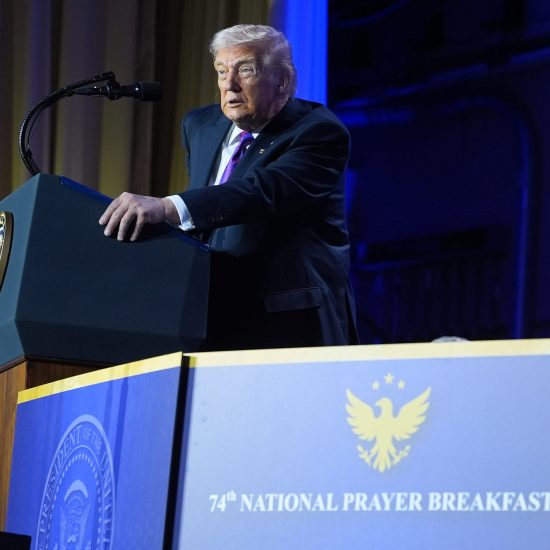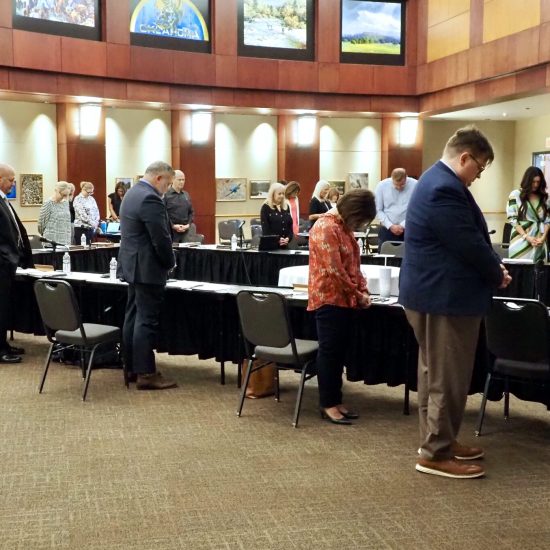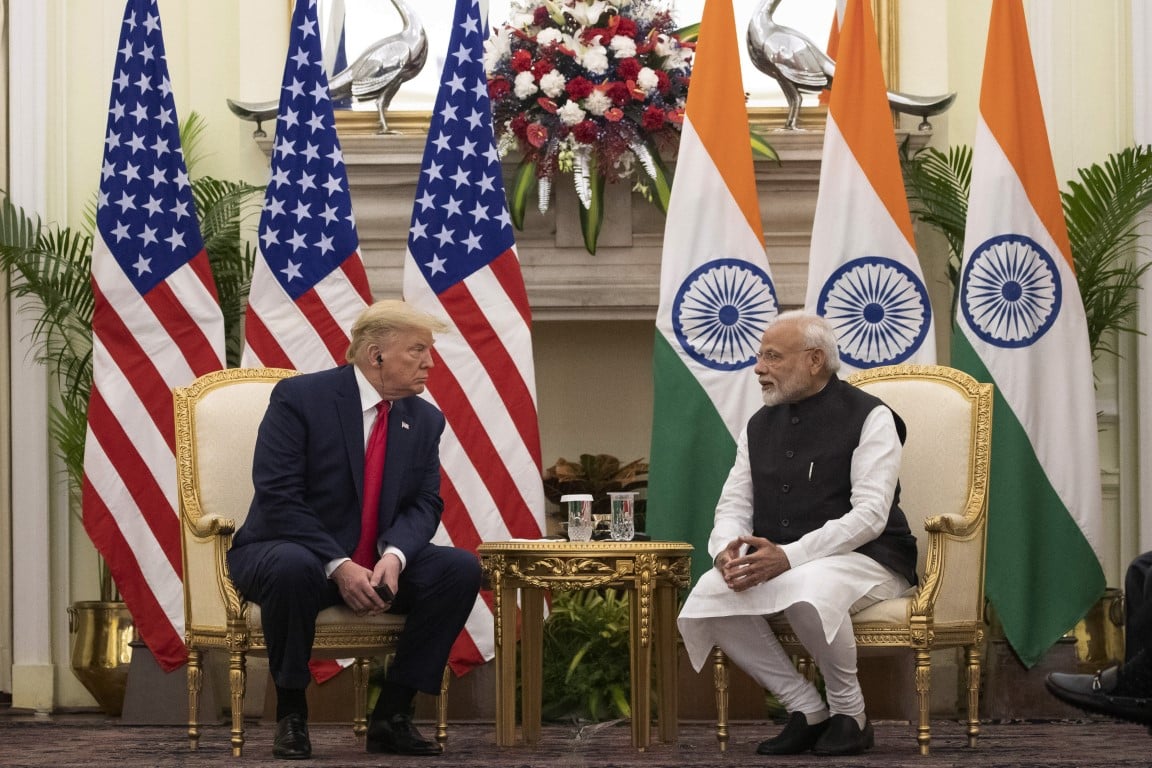
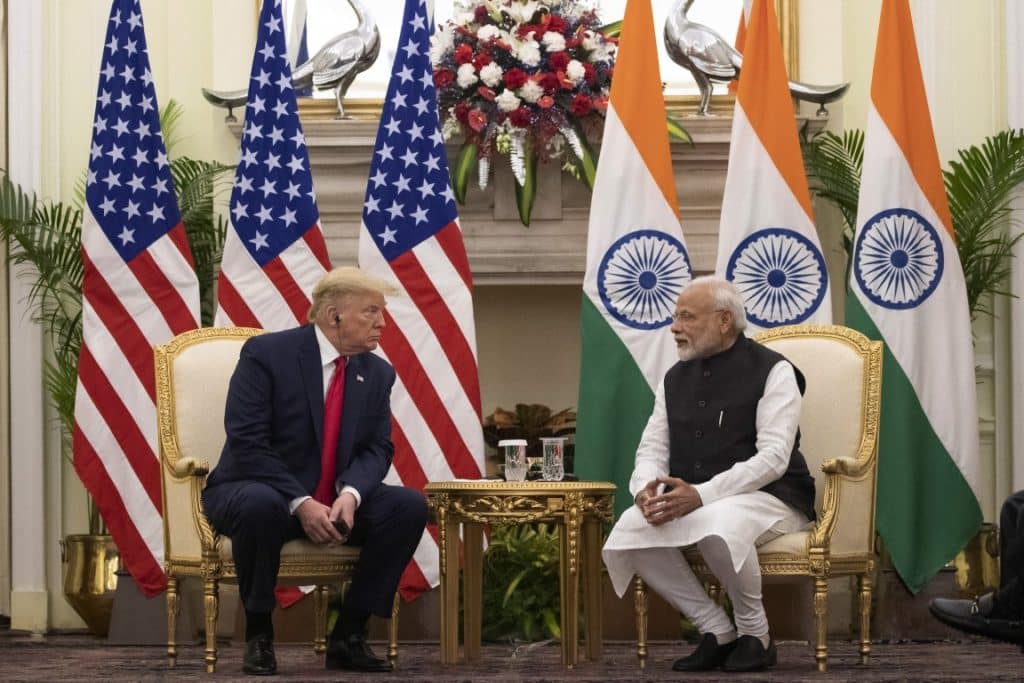
U.S. President Donald Trump and Indian Prime Minister Narendra Modi sit for a meeting at Hyderabad House on Feb. 25, 2020, in New Delhi. (AP Photo/Alex Brandon)
(RNS) — I am no fan of the United States Commission on International Religious Freedom.
Created under the 1998 International Religious Freedom Act, USCIRF has nine commissioners and a dozen or so staff members who spend their time compiling annual reports on religious freedom around the world that parallel the State Department’s own reports and issuing statements criticizing foreign countries for religious persecution while hectoring and occasionally praising the U.S. administration and Congress for their words and deeds in the international religious freedom arena.
In short, in an inversion of Teddy Roosevelt’s dictum, USCIRF speaks loudly and carries no stick at all. And not surprisingly, over the years its words had little effect beyond annoying the objects of the criticism.
But if we must have a government-sponsored and funded religious freedom gadfly, it should at least be an equal opportunity annoyance.
And indeed, beginning with Bill Clinton, USCIRF has made a practice of issuing public statements calling on whoever happens to be president to raise religious freedom issues when meeting with foreign leaders of countries about which it has concerns. Clinton and George W. Bush got their share. Barack Obama got his before sitting down with the leaders of Russia ( 2009, 2010 ), Turkey ( 2009, 2010 ), India ( 2010 ), Indonesia ( 2010 ), China ( 2012, 2016), Pakistan ( 2013 ), Egypt ( 2013 ), and Laos ( 2016 ).
With President Trump, comparable calls have been fewer and farther between: one before his meeting with Turkish President Erdoğan in September 2018 and another before his meeting with North Korean President Kim Jong-un in January 2019. But USCIRF did not pipe up before he got together with Saudi Prince Muhammad bin Sultan (as it did before the second President Bush went to Riyadh in 2008) or with Russian President Putin (as it did before President Clinton met with the Russian leader in 2000).
So does USCIRF pull its punches when it comes to Trump?
In the past, the commission has not lacked for critics who thought something partisan was afoot. In the 2000s, the panel seemed disproportionately interested in the pro-Christian agenda of right-wing commissioners who were perpetually re-appointed by Republican officeholders.
In 2011, USCIRF was nearly sunsetted when its reauthorization was held up by Illinois Sen. Dick Durban. In the end, a compromise was reached that limited each commissioner to one re-appointment.
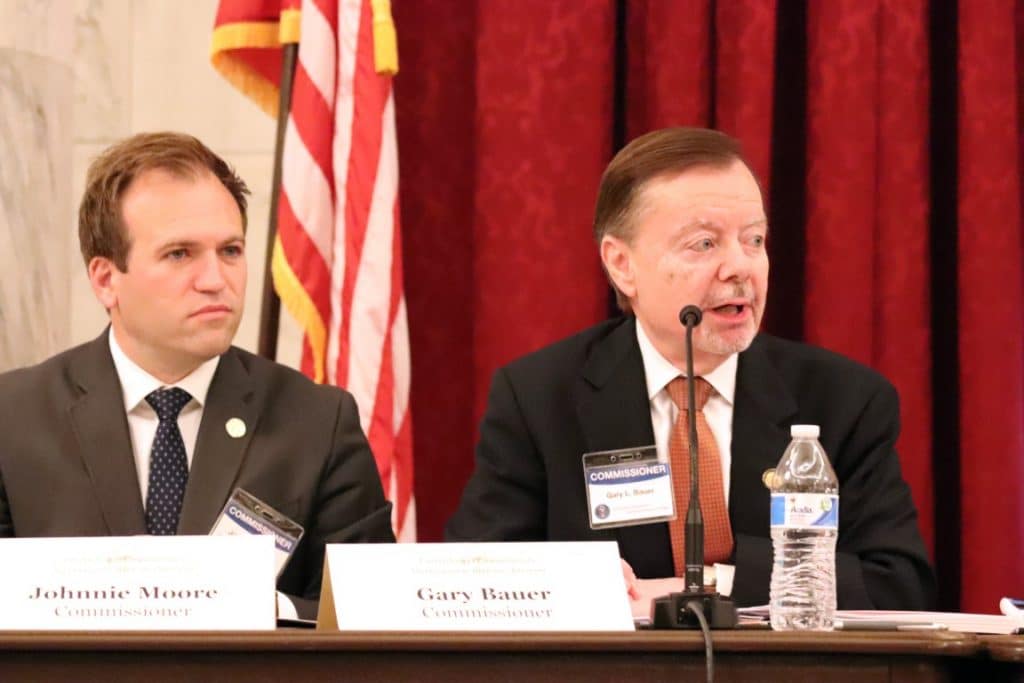
USCIRF commissioners Johnnie Moore, left, and Gary Bauer speak about the 2019 annual report during a news conference on April 29, 2019, in Washington. RNS photo by Adelle M. Banks
With reauthorization up again in 2019, Democrats pushed for stricter rules, including keeping a leash on commissioners who flaunted their official capacity while freelancing. Let’s just say that this may have had something to do with the three commissioners who happen to be among Trump’s foremost evangelical supporters: Tony Perkins, elected commission chair last June; Gary Bauer, re-appointed to the commission by Trump in 2018; and Johnnie Moore, appointed to the commission by Trump in 2018.
And yet, in 2019, USCIRF was hard to criticize for partisanship.
Last September, for example, Perkins put out a statemen t expressing “alarm” that the Trump administration was planning to reduce the number of refugees resettled in the U.S. “We strongly urge the administration to extend its admirable commitment to advancing religious freedom to its refugee resettlement policy,” Perkins said.
On December 16, USCIRF declared its support for a bipartisan bill titled the Ukraine Religious Freedom Support Act, which called on the president to designate Russia as a “country of particular concern” for violating religious freedom in Russia-occupied Crimea and Russia-controlled Donbas. A month before Trump’s impeachment trial in the Senate, USCIRF support for Ukraine against Russia cannot have been high on the White House wish list.
Then, on December 17, with its funding due to run out December 21, senators agreed to reauthorize USCIRF for three more years at $3.5 million per year. Coincidence? For those paying attention, the question was whether the non-partisanship of 2019 would continue.
The big international religious freedom crisis of the moment is India, thanks to Prime Minister Modi’s Citizen Amendment Act. On December 9, USCIRF issued a statement describing itself as “deeply troubled” by passage of the bill in India’s lower house. The CAA, it said, “enshrines a pathway to citizenship for immigrants that specifically excludes Muslims, setting a legal criterion for citizenship based on religion.”
It further called the CAA “a dangerous turn in the wrong direction; it runs counter to India’s rich history of secular pluralism and the Indian Constitution, which guarantees equality before the law regardless of faith.”
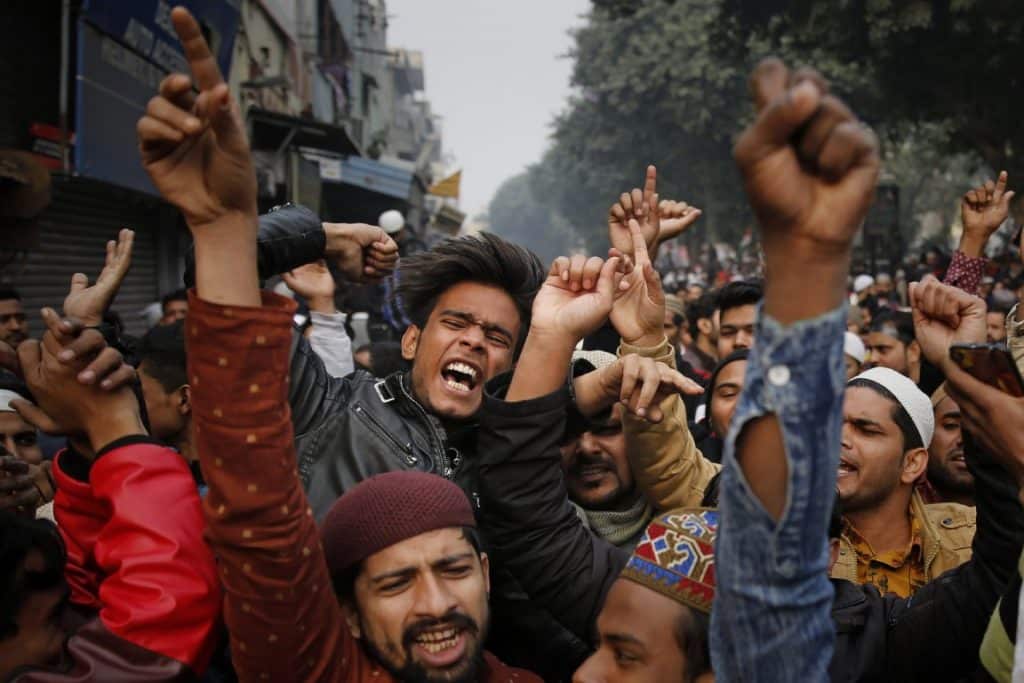
Indians shout slogans in front of a police barricade to protest against the Citizenship Amendment Act in New Delhi, India, Friday, Dec. 20, 2019. (AP Photo/Altaf Qadri)
This month, USCIRF announced that the CAA would be the subject of a special hearing on citizenship laws and religious freedom and put out a fact sheet demonstrating why CAA represents a “significant downward turn in religious freedom in India.”
But did it call on President Trump to raise religious freedom with Prime Minister Modi when the two met? It did not. Nor did it express dismay at Trump’s comments to reporters on the subject:
“We did talk about religious freedom, and I will say that the prime minister was incredible on what he told me. He wants people to have religious freedom, and very strongly. They have really worked hard on religious freedom. We talked about it for a long time and I really believe that’s what he wants.”
Just as Trump believed Putin over his intelligence professionals, so he believes Modi over his USCIRF commissioners.
Then, on Wednesday, USCIRF issued a statement deploring the violence that had broken out across the Indian capital city of Delhi against Muslims, violence that came “in the wake of widespread protests against the Citizenship (Amendment) Act following its passage in December 2019.”
The quote from Tony Perkins was: “We urge the Indian government to take serious efforts to protect Muslims and others targeted by mob violence.”
Well, yes, but there was no mention of the man who had inflicted the CAA on India. Or of the man whose own efforts to restrict Muslim immigration to the U.S. led the way for Modi’s action.
If USCIRF can’t put its mouth where its money is, what’s the point?





